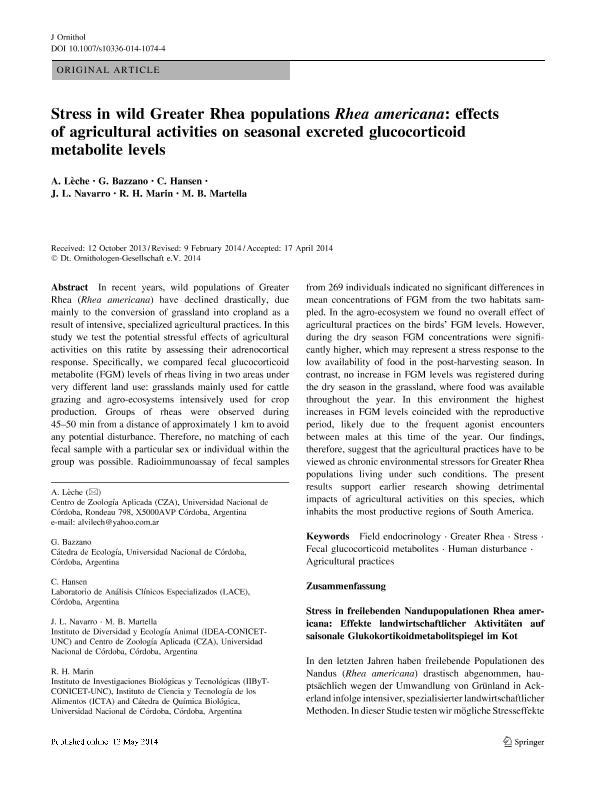Artículo
Stress in wild Greater Rhea populations: effects of agricultural activities on seasonal excreted glucocorticoid metabolite levels
Leche, Alvina ; Bazzano, Gisela del Valle
; Bazzano, Gisela del Valle ; Hansen, C.; Navarro, Joaquin Luis
; Hansen, C.; Navarro, Joaquin Luis ; Marin, Raul Hector
; Marin, Raul Hector ; Martella, Monica Beatriz
; Martella, Monica Beatriz
 ; Bazzano, Gisela del Valle
; Bazzano, Gisela del Valle ; Hansen, C.; Navarro, Joaquin Luis
; Hansen, C.; Navarro, Joaquin Luis ; Marin, Raul Hector
; Marin, Raul Hector ; Martella, Monica Beatriz
; Martella, Monica Beatriz
Fecha de publicación:
05/2014
Editorial:
Springer
Revista:
Journal of Ornithology
ISSN:
2193-7192
Idioma:
Inglés
Tipo de recurso:
Artículo publicado
Clasificación temática:
Resumen
In recent years, wild populations of Greater Rhea (Rhea americana) have declined drastically, due mainly to the conversion of grassland into cropland as a result of intensive, specialized agricultural practices. In this study we evaluate potential stressfuleffects of agricultural activities on this ratite by assessing their adrenocortical response. Specifically, we compared fecal glucocorticoid metabolite (FGM) levels of rheas living in two areas under very different land use: grasslands mainly devoted to cattle grazing and agro-ecosystems intensively used for crop production. Radioimmunoanalysis of fecal samples from 269 individuals indicated no significant differences in mean concentrations of FGM according to habitat type. In the agro-ecosystem we found no direct effect between agricultural practice and the bird´s FGM levels. However, FGM concentrations were significantly higher during the dry season, which may represent a stress response to the low availability of forage due to harvesting. In contrast, no increase in the FGM levels was registered during the dry season in the grassland, where ample forage was available throughout the year. In this environment the highest increases in FGM levels coincided with the reproductive period, likely due to the frequent agonist encounters between males at this time of the year. Our findings therefore suggest that the consequences of agricultural practices may constitute a chronic environmental stressor for Greater Rhea populations living under such conditions. The present study support earlier research showing detrimental impacts of agricultural activities on this species, whose area of distribution coincides with the most productive regions of South America.
Archivos asociados
Licencia
Identificadores
Colecciones
Articulos(IDEA)
Articulos de INSTITUTO DE DIVERSIDAD Y ECOLOGIA ANIMAL
Articulos de INSTITUTO DE DIVERSIDAD Y ECOLOGIA ANIMAL
Citación
Leche, Alvina; Bazzano, Gisela del Valle; Hansen, C.; Navarro, Joaquin Luis; Marin, Raul Hector; et al.; Stress in wild Greater Rhea populations: effects of agricultural activities on seasonal excreted glucocorticoid metabolite levels; Springer; Journal of Ornithology; 155; 4; 5-2014; 919-926
Compartir
Altmétricas



